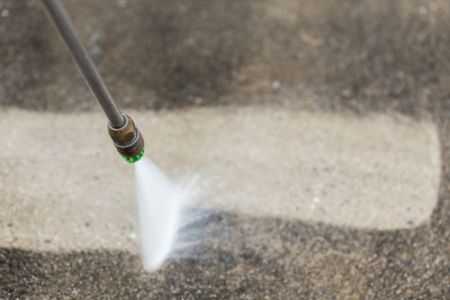Concrete Cleaning in Auburn: Hot Water vs. Cold Water and When Each Wins

If your concrete looks tired after a long Alabama summer, you are not alone. Humidity, red clay, pollen, and game day foot traffic put a beating on driveways and sidewalks across Auburn. The right temperature makes all the difference. Below, we break down how our pressure washing team at Gibson Pressure Washing LLC decides between hot and cold water so your concrete gets the safest, best-looking clean possible. When you are ready, our concrete cleaning service is set up to deliver consistent results across driveways, walkways, patios, and pool decks.
We will also touch on special cases like grease spills, gum stuck to the sidewalk, and busy commercial entries. If you are comparing options for concrete cleaning in Auburn, this guide will help you understand the approach your pro should take and why it matters.
Why Water Temperature Matters
Concrete is porous. Spills, traffic films, and organic growth settle into tiny pores and capillaries. Temperature changes how quickly those contaminants loosen and how well detergents work. Hot water adds energy that speeds up chemistry and helps lift oily soils. Cold water relies more on detergent selection and rinse volume, which can be ideal for broad areas with lighter grime.
Think about washing a greasy pan. Warm water cuts the film faster, but you do not need boiling water to rinse away everyday dust. Concrete behaves similarly, although it is far tougher than a pan and needs professional equipment and techniques to clean safely.
Hot Water Pressure Washing: When It Wins
Hot water shines when the soil is sticky, oily, or bonded to the surface. We use controlled heat with the right nozzles and detergents to target tough buildup without scarring the concrete finish. Here are the most common hot water wins we see around Auburn:
- Driveway drips and garage slab spots from motor oil or transmission fluid. This is classic grease removal where hot water helps break the bond, then detergents and agitation finish the job.
- Food-based stains near grills or outdoor kitchens. Animal fats and cooking oils respond much better to heat.
- Chewing gum stuck to sidewalks outside busy storefronts or near campus. Gum removal is faster and safer with heated water plus the right tool, which helps lift the gum without chiseling the concrete.
- Commercial dumpster pads, loading zones, and drive-thrus with layered petroleum residue. Hot water aids degreasing and cuts odor.
If you have read that “grease removal needs hot water,” you are seeing the same principle we apply daily. Hot water breaks the bond of oils and grease faster than cold water, which means a better clean and less time on the surface.
Cold Water Pressure Washing: Where It Shines
Cold water paired with the correct cleaner and dwell time is a smart, efficient choice for large areas of typical soil. In Auburn, that usually means wind-blown dust, red clay film, mildew, and spring pollen on sidewalks and patios. Cold water is also perfect for soft-rinse maintenance on concrete that is already in good shape.
Examples where cold water is often the right call:
- Sidewalks shaded by trees that show algae or mildew. The right algaecide does the heavy lifting, then a cold-water rinse clears residue.
- Pool decks with sunscreen scum and light organic growth. Proper chemistry prevents slip hazards while being gentle around water features.
- Neighborhood walkways after the spring pollen surge. Cold water clears the yellow film quickly without unnecessary heat.
Cold water paired with pro detergents handles algae and pollen affordably. It is efficient for broad rinses and periodic maintenance, especially when heat would add no benefit.
Matching Method To Your Surface
Not all concrete is the same. Broom-finished driveways, stamped patios, exposed aggregate pool decks, and polished garage slabs each respond differently to pressure, temperature, and chemistry. Surface age and condition also matter. Hairline cracks, scaling, or a worn sealer change how we approach the job.
Our technicians assess the surface and soil type first, then choose water temperature. For example, a new broom-finish driveway with clay film will likely earn a cold-water clean with a surface cleaner and targeted detergent. A stained garage slab with oil spots may need heated water in those specific areas followed by a uniform rinse so the finish looks even. High pressure on damaged concrete can make cracks worse, so we balance pressure, temperature, and flow to protect the surface while restoring color.
Commercial Sidewalk Cleaning Around Auburn
Downtown foot traffic, campus visitors, and busy shopping centers mean regular commercial sidewalk cleaning is essential for curb appeal and safety. Heated water usually wins for food drips, drink sugars, and especially gum near storefronts and restaurants. Cold water earns its keep for wide, lightly soiled stretches after events or on routine maintenance passes.
What about the best method for gum removal? In our experience, the best method uses heat, controlled pressure, and a specialized surface tool to lift gum without gouging the cement paste. The goal is a clean, uniform look that blends with the surrounding panel, not a patchy spot that calls attention to itself.
Grease, Gum, and Red Clay: Auburn’s Three Toughest Stains
Grease removal with hot water is the standout for automotive fluids and grill drips. Gum removal benefits from heat and the right tooling, especially near high-traffic entries. Red clay is a different animal. It needs targeted detergents that release iron-rich particles from the pores. Heat can help in cool weather, but chemistry and rinse technique do most of the work with clay.
If you want a deeper look at long-term maintenance strategy, this Auburn pressure washing article on ways pressure washing can save you money explains how routine care extends the life of exterior surfaces.
Hot Vs. Cold At A Glance
Use this quick side-by-side to understand why your technician may choose one method over the other during the same visit.
- Hot water: grease and oil spills, gum on commercial sidewalks, food stains near patios, and dumpster pads where sanitation matters.
- Cold water: algae, mildew, clay film, and pollen across large areas where efficiency and even rinsing are priorities.
On many projects we combine methods. For example, spot-treat an oil stain with heat, then complete the rest of the driveway using cold water and a surface cleaner for a consistent finish.
Seasonal Considerations In Auburn, AL
Weather shapes the cleaning plan. Summers are hot and humid, so organic growth returns faster on shaded concrete. Fall and winter bring cooler mornings, which can make hot water helpful on oily spots and in early start times. Game weekends bring more foot traffic downtown, which presses gum into the pores of the concrete. Selecting heat or cold is not just about stains. It is also about timing, safety, and how the surface will look once it dries in our local climate.
Detergents, Dwell Time, And Rinse Technique
Water temperature is only one lever. The right solution, the time it sits, and the way the rinse happens will decide the outcome. On slippery algae, for example, we apply a cleaner that neutralizes growth, give it time to work, and then rinse evenly to avoid swirl marks. On grease, we may agitate with a surface tool before rinsing. Technique is how we avoid visible stripes and ensure the concrete dries to a uniform tone.
Driveways, Garages, And Pool Decks
Each area has a different mix of soils. Driveways show vehicle leaks and clay splashback after heavy rain. Garages collect drips, brake dust, and tire marks. Pool decks get sunscreen residue and algae where water lingers. We adjust temperature and chemistry to match. If your driveway needs more attention than your walkways, you can pair this service with professional driveway washing for a curb-to-garage refresh in one visit.
Safety And Surface Protection
Concrete is strong, but the surface can still be etched or scarred with the wrong settings. Temperature does not replace technique. That is why we focus on nozzle distance, fan pattern, and controlled passes. We also watch drainage so dirty rinse water moves away from flower beds and entry thresholds. For commercial entries, we schedule work to minimize slip risks and mark drying areas before opening doors.
How Gibson Pressure Washing LLC Chooses The Best Approach
Our process starts with a quick walkthrough and a few questions. What kinds of stains do you see most? Where does water pool after storms? Are there high-traffic pinch points near steps or storefronts? Then we test a small area, select temperature, and confirm the chemistry. The goal is a uniform clean that looks great from the curb and up close.
We keep the plan simple: target the worst soils with heat where it pays off, clean the broad areas efficiently with cold water, and finish with an even rinse so everything matches. That balance delivers a clean surface without the risks that come from forcing one method to fit every situation.
Real-World Examples Around Town
On a downtown sidewalk near restaurants, heat helps remove gum and food sugars quickly so the concrete looks even before doors open. In a shaded neighborhood off North College Street, cold water with the right solution clears algae and keeps texture intact. At a garage near Auburn University, heated spot treatment breaks down oil where vehicles park, then a cool rinse blends the finish across the slab. These choices are not one-size-fits-all. They are tailored to Auburn’s surfaces and soils.
Your Next Step To Cleaner Concrete
If your driveway, patio, or commercial entry needs attention, your best move is to schedule a visit with our team. We will evaluate your stains, choose the right temperature, and deliver a result that looks crisp from the street and safe underfoot. You can learn more about what is included in our concrete cleaning and pick a time that fits your schedule.
Have questions about a stubborn stain or need fast service before an event? Call 706-518-4886 and a friendly pro at Gibson Pressure Washing LLC will help you plan the right approach. When you are ready to improve curb appeal and traction, use our concrete cleaning to get a clean surface that lasts in Auburn’s weather.

Auburn Pressure Washing Tips
-
Deck & Fence Cleaning Without Fuzzing or Feathering: Pro PSI & Chemical Tips
If you search for deck cleaning Auburn every spring, you already know how our humid climate can be tough on wood. Mold, algae, and red clay splash marks age decks and fences faster than most homeowners expect. Here is how Gibson Pressure Washing LLC protects wood […]
-
Gutter Cleaning & Brightening: What ‘Tiger Stripes’ Are & How Pros Remove Them
If you have noticed dark streaks running down your gutters, you are seeing “tiger stripes.” They are common across Auburn, especially after humid summers and stormy falls. The fastest way to restore curb appeal is booking professional gutter cleaning and brightening with Gibson Pressure Washing LLC. […]
